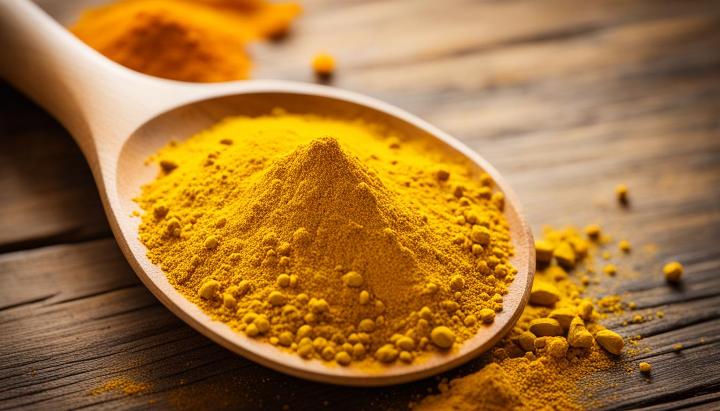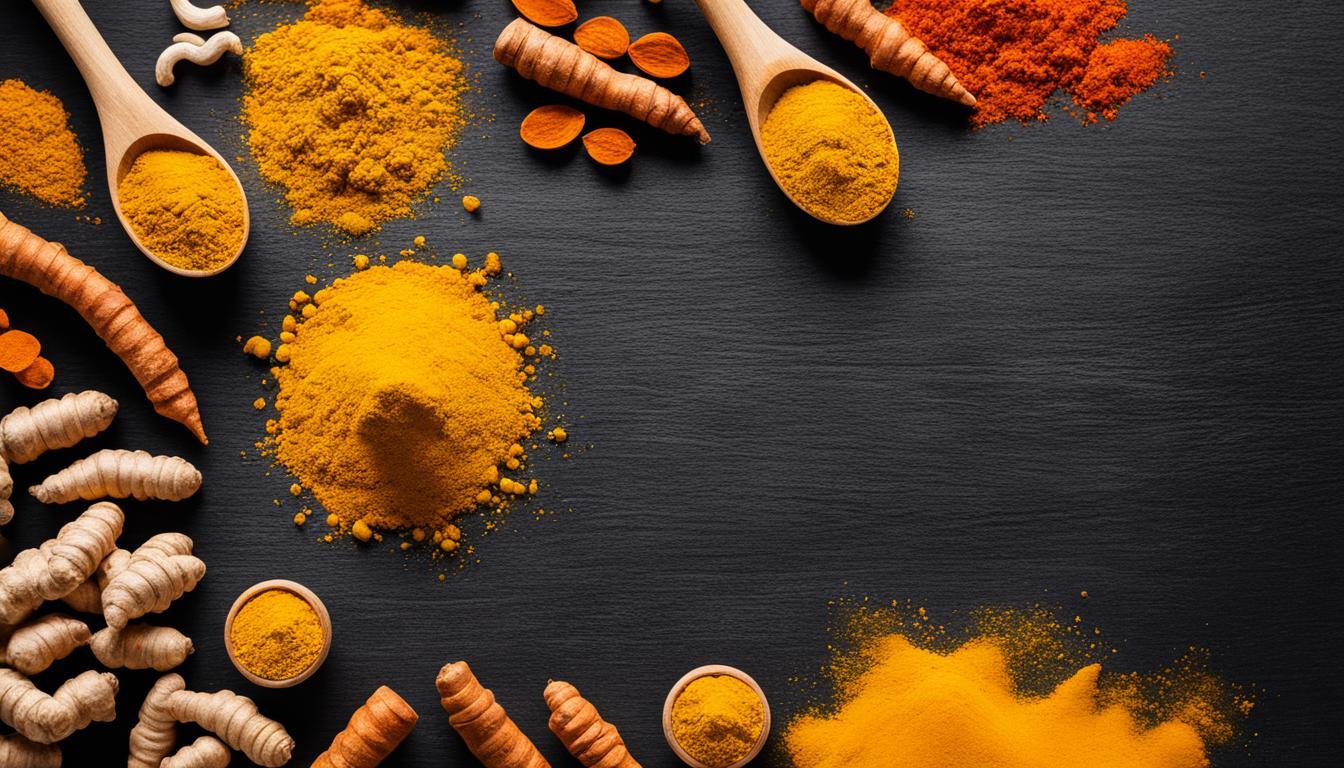Turmeric's Nutritional Benefits Explored

Did you know that turmeric, the vibrant spice known for its distinct flavor and color, is also a nutritional powerhouse with a wide range of health benefits? This humble spice, commonly used in Indian and Asian cuisine, has caught the attention of researchers and health enthusiasts alike due to its remarkable properties.
From its anti-inflammatory and antioxidant properties to its potential to support the immune system and promote overall wellness, turmeric offers a holistic approach to health. In this article, we will delve into the nutritional benefits of turmeric, explore its history and active compounds, and uncover the science behind its healing properties. Additionally, we will provide practical tips on how to integrate this versatile spice into your daily diet.
Key Takeaways:
Turmeric is a nutritional powerhouse with a wide range of health benefits.
It possesses anti-inflammatory and antioxidant properties that can support overall wellness.
Turmeric has a long history of use in cooking and traditional medicine.
The active compound in turmeric, curcumin, is responsible for its potent properties.
By incorporating turmeric into your diet, you can enjoy its nutritional benefits and enhance your well-being.
Unveiling Turmeric's History and Active Compounds
Turmeric, a deep golden-orange spice, boasts a fascinating history dating back centuries. It has been an essential ingredient in Asian and Indian cuisine, offering both flavor and medicinal properties.
A Historical Perspective on Turmeric Use
The use of turmeric can be traced back to ancient times, where it was an integral part of Ayurvedic and traditional medicine systems. In addition to its culinary uses, turmeric was valued for its various health benefits, including its potential to aid digestion, improve skin health, and support overall well-being.
Curcumin: The Key to Turmeric’s Health Promoting Powers
The active compound in turmeric responsible for its remarkable health benefits is curcumin. Curcumin is a potent antioxidant and anti-inflammatory agent. These properties play a significant role in turmeric's disease-preventing abilities.
The Role of Phytonutrients in Disease Prevention
Turmeric is not only rich in curcumin but also contains an array of phytonutrients. These plant-based compounds act as powerful antioxidants, protecting the body from damage caused by free radicals. By neutralizing these harmful molecules, phytonutrients in turmeric contribute to disease prevention, potentially reducing the risk of conditions such as cancer and heart disease.
Turmeric's history and active compounds reveal why it has become a highly regarded spice in culinary and medicinal practices. Harnessing the benefits of curcumin and the diverse array of phytonutrients found in turmeric can contribute to overall health and well-being.
Nutritional Benefits of Turmeric
Turmeric is a superfood that offers numerous health advantages due to its rich nutritional profile. Not only does it add a vibrant color and flavor to dishes, but it also provides essential nutrients that support overall well-being.

When it comes to turmeric nutrition facts, this golden spice contains protein, fat, carbohydrates, and fiber, making it a well-rounded addition to any diet. Additionally, turmeric is packed with various vitamins and minerals, imparting its remarkable health benefits.
One of the standout nutrients in turmeric is curcumin, its active compound. Curcumin is known for its potent anti-inflammatory and antioxidant properties, contributing to the spice's wellness-promoting capabilities.
Furthermore, turmeric is an excellent source of minerals such as manganese, iron, and potassium. These minerals are essential for various bodily functions, including maintaining healthy bones, supporting heart health, and regulating blood pressure.
In addition to minerals, turmeric is also rich in vitamin C, which is crucial for a strong immune system and collagen production. Vitamin Caids in wound healing, supports iron absorption, and acts as a powerful antioxidant.
Incorporating turmeric into your diet can be a simple and delicious way to reap its nutritional benefits. Whether you add it to curries, soups, smoothies, or even golden milk, this superfood spice can contribute to your overall wellness and enhance your culinary experience.
The Science Behind Turmeric as a Healing Agent
Curcumin, the active compound in turmeric, has been the subject of scientific studies that have shown its remarkable anti-inflammatory effects and antioxidant properties. These properties make turmeric a potential healing agent for various health conditions.
Exploring Anti-Inflammatory and Antioxidant Effects of Curcumin
Curcumin, found abundantly in turmeric, has been found to have powerful anti-inflammatory effects. It inhibits the production of inflammatory molecules in the body, which can help reduce inflammation and alleviate symptoms associated with conditions like arthritis and other inflammatory disorders.
Furthermore, curcumin is a potent antioxidant that can neutralize harmful free radicals, reducing oxidative stress and damage to cells. This antioxidant property contributes to turmeric's protective effects against chronic diseases such as cancer and heart disease.
How Curcumin Influences Brain Health and Function
Scientific research has shown that curcumin may also have significant benefits for brain health. Curcumin has neuroprotective properties, meaning it can help protect brain cells from damage and promote overall brain health.
Curcumin has been found to increase levels of brain-derived neurotrophic factor (BDNF), a protein that plays a crucial role in promoting the growth and survival of brain cells. By enhancing BDNF levels, curcumin can potentially improve brain function and protect against age-related cognitive decline and neurodegenerative diseases like Alzheimer's.
The Potential for Curcumin in Supporting Cardiovascular Wellness
Studies have suggested that curcumin may also have benefits for cardiovascular health. Curcumin has been found to reduce inflammation, a key factor in the development of heart disease. It helps to lower levels of inflammatory markers in the body and protects the endothelial lining of blood vessels, improving their function.
Furthermore, curcumin has been shown to have anti-thrombotic effects, reducing the formation of blood clots and the risk of blood vessel blockage. These effects contribute to curcumin's potential in supporting cardiovascular wellnessand reducing the risk of heart disease.

As ongoing research delves deeper into the science behind turmeric and curcumin, it becomes increasingly clear that their potential healing properties extend beyond the kitchen. The anti-inflammatory and antioxidant effects of curcumin, coupled with its influence on brain health and cardiovascular wellness, highlight the remarkable benefits that turmeric can offer as a natural healing agent.
Practical Ways to Integrate Turmeric into Your Diet
Now that we understand the nutritional benefits of turmeric and its potential for improving overall wellness, let's explore some practical ways to incorporate this vibrant spice into our daily diet. By adding turmeric to our favorite dishes and experimenting with DIY recipes, we can enjoy its health-promoting properties while indulging in delicious meals.
Incorporating Turmeric in Everyday Cooking
Turmeric can effortlessly become a staple in our kitchen by incorporating it into various everyday cooking recipes. Whether we are preparing curries, soups, stews, or sauces, turmeric adds a warm, earthy flavor and a pop of color to our dishes. By incorporating turmeric into our favorite recipes, we can unlock its full potential and experience the numerous health benefits it offers.
DIY Turmeric Recipes for Holistic Health Benefits
For those looking to get creative with turmeric, there are numerous DIY recipes that can provide holistic health benefits. From golden milk, a comforting beverage known for its immune-boosting properties, to turmeric-infused rice and turmeric roasted vegetables, there are countless ways to experiment with turmeric in the kitchen. We can even explore turmeric tea for immune support or a soothing turmeric face mask for glowing skin. The possibilities are endless!

Understanding Turmeric Supplements vs. Whole Food Forms
While turmeric supplements are widely available, it's important to note that whole food forms of turmeric are generally more effective in providing the full range of benefits compared to isolated curcumin supplements. The synergistic interaction of turmeric's compounds in their natural form is thought to offer enhanced bioavailability and health benefits. However, if considering turmeric supplements, it is crucial to consult with a healthcare professional to determine the appropriate dosage and any potential interactions with medications.
Turmeric Spice Uses | Turmeric Recipes | Turmeric for Joint Health | Turmeric Supplements | Turmeric Uses and Benefits |
Seasoning for curries, soups, stews, and sauces | Golden milk, turmeric rice, turmeric roasted vegetables | May help manage joint inflammation and discomfort | Consider consulting with a healthcare professional | Anti-inflammatory, antioxidant, immune support |
From sprinkling turmeric on our meals to exploring new recipes and being mindful of the form we consume, we can effortlessly incorporate this powerful spice into our daily routine. Let's embrace the potential of turmeric and its numerous uses and benefits to support our overall well-being.
Conclusion
We have explored the many benefits of turmeric and its potential to improve our health. This powerful spice offers a range of advantages, including its anti-inflammatory and antioxidant effects. By incorporating turmeric into our diet, we can support our immune health, reduce inflammation, and even improve brain function. It may also have the potential to lower the risk of chronic diseases.
When it comes to enjoying turmeric's nutritional benefits, incorporating it into our everyday cooking or using whole food forms is a safe and effective approach. Whether adding it to curries, soups, stews, or sauces, there are endless possibilities to bring the vibrant flavor and health benefits of turmeric into our meals.
While turmeric supplements are available, it is essential to exercise caution and consult with a healthcare professional before taking them. This is because turmeric supplements can have potential side effects and may interact with medications. Therefore, it is always best to seek professional advice to ensure our health and well-being.






